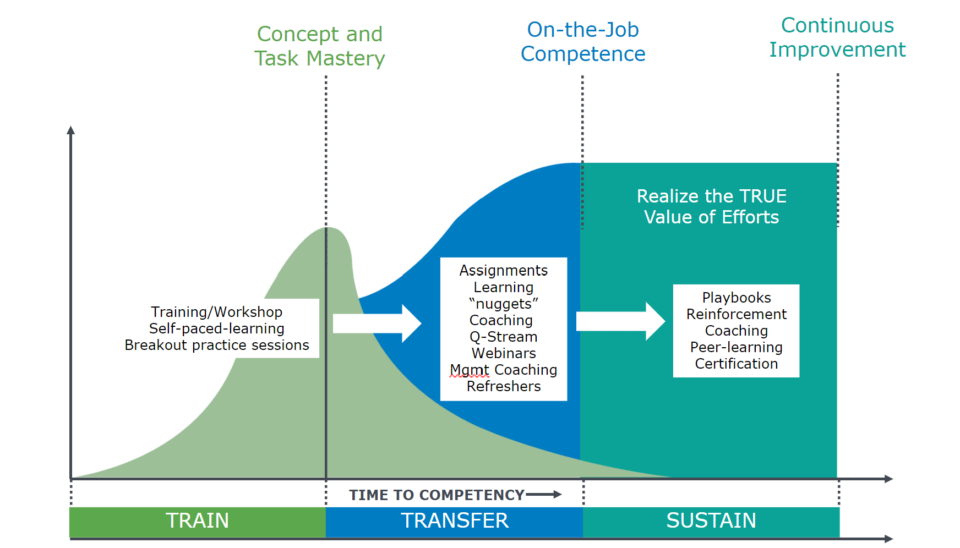Today, investing in learning and development is a must. But does it actually pay off? Far too often, training is just a box-ticking exercise and knowledge is quickly forgotten. So, how do you build an effective learning journey, one that embeds knowledge into your organization, and that drives a change in behavior and mindset?
2 rules of thumb before you start
When we map out an effective learning journey, we always consider the following rules of thumb:
- The Ebbinghaus Forgetting Curve: up to 90% of new tools and concepts get forgotten after a workshop or training.
- The 70-20-10 rule, or the balance between the different modes of learning:
- 70% = on-the-job learning
- 20% = social learning by working together, coaching and mentoring
- 10% = learning from courses and workshops
3 stages in a learning journey

1. Train
Trainings and workshops are only one stage of the learning journey. For optimal effect, we work with various techniques in this stage, such as breakout sessions, self-paced learning and role-playing. These techniques make knowledge more digestible.
2. Transfer
In the next stage, we apply that knowledge to the workplace. Again, we deploy a mix of techniques and formats, such as working with assignments or incorporating learning nuggets.
3. Sustain
The most important thing, of course, is that learning not only leads to one-time knowledge accumulation, but also to long-term impact. Through coaching or peer-learning, for example, you not only embed knowledge, but you can also achieve a change in behavior and mindset.
From our experience in designing learning journeys that really pay off, we’d like to offer some tips & tricks:
5 tips for an effective learning journey
- Make room for spaced learning. This is learning over a longer period of time combined with repetition. Very useful tools are assignments, interactive short refresher videos (like our learning nuggets) and webinars.
- Make knowledge digestible with micro-learning. Split up complex material into digestible pieces. This not only ensures that knowledge will stick because of repetition, but it also prevents mental fatigue.
- Translate knowledge to the work context. Applying abstract concepts in their own work environment enables people to change habits and behaviors. We often link this to group coaching, peer coaching or mobile applications, such as Qstream (= targeted individual coaching of sales managers based on data insights).
- Provide content that is relevant to your business and your team goals. This seems obvious, but it requires an accurate analysis of the challenges within your business and team. Relevant content increases engagement, enhances applicability on the job and leads to tangible results.
- Build a performance dashboard. This enables you to officially embed the tools and concepts within your organization and to measure growth, results and engagement.



 Pascal Persyn
Pascal Persyn